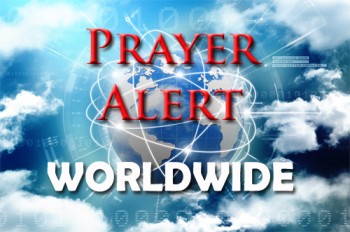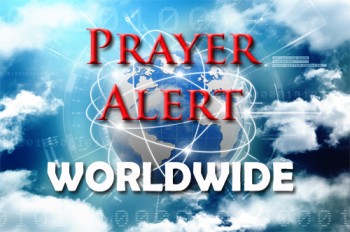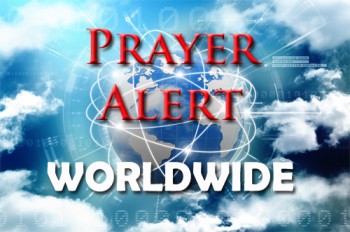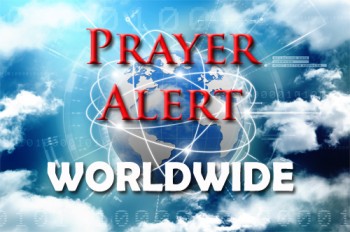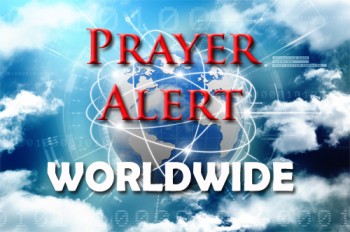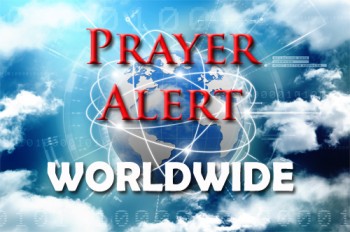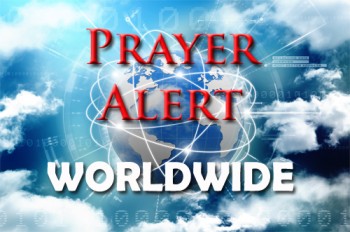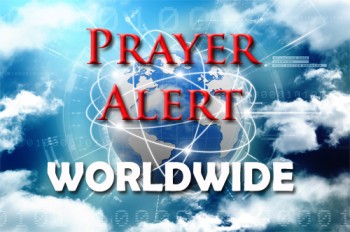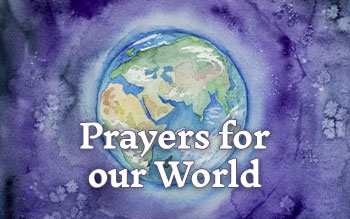Displaying items by tag: Africa
Sudan signs peace deal with rebel coalition
Sudan’s government has reached a peace agreement with a coalition of rebel groups from Darfur and other regions in the country. The agreement, which should end a civil war that has raged since 2003 and has killed 300,000 people in Darfur alone, covers land ownership, power-sharing between all parties involved, and the return of people who have fled their homes in the civil war. Rebel forces will be dismantled, but fighters will have the opportunity to join the Sudanese military. There is hope for the future. Todd Nettleton of Voice of the Martyrs says, ‘This agreement should, at least in theory, pave the way for peaceful coexistence within Sudan. Hopefully, a nation that is not focused on fighting against others within its borders can focus instead on development and on moving forward to what we hope will be a civilian rule.’
Ethiopia: at least 500 Christians slaughtered
An Ethiopian Christian leader called for an international inquiry into over 500 Christians killed since the end of June - including pregnant women, children and whole families. The coordinated slaughter was by the Muslim Oromo ethnic group who are members of Qeerroo (meaning bachelors), a male youth movement. In door-to-door attacks, they arrived in cars and, armed with guns, machetes, swords and spears, sought out and slaughtered Christians. Children were forced to witness their parents being brutally murdered with machetes. Some militants held lists of Christians and were helped by local authorities, often run by Muslims, to find individuals, particularly those actively involved in supporting the Church. Oromo ethnic Christians were also targeted. One was beheaded for refusing to deny his faith by tearing off the thread around his neck (worn as a sign of his baptism).
Egypt: women struggling to survive pandemic
Maria, an Egyptian widow, was in tears when telling a local ministry leader that she had lost her job as a housecleaner due to coronavirus lockdown. She supports seven family members, including a daughter with two infants who is separated from her drug-addicted husband and a married son with two children who has lost his job and home due to coronavirus. She sold her kitchen appliances to meet their basic needs. Many widowed women in Egypt have lost their jobs to the pandemic and have no other sources of income, as the government has also suspended disbursement of pensions due to the crowds gathering at offices. Most widows are without a fixed monthly income or a fixed pension. Some have coronavirus, and some have lost a family member to it. Christian Aid has created WhatsApp groups for women and children and supports them spiritually by making prayer times and sharing sermons and songs.
South Africa: community organises Covid-19 healthcare system
South Africa’s pandemic infections seem to have reached a ceiling. However, with the fifth highest total in the world, no one is celebrating. The government had months to prepare, but there is a critical shortage of beds, staff and equipment. There are allegations of corruption by public officials ordering coronavirus-related supplies. As chaos and uncertainty swirled around official responses to the virus, a group of Muslims, Hindus, Sikhs and Christians living and working in Lenasia decided to construct their own response as thousands of locals fell ill. Aboobaker Sayed started a community healthcare system in the middle of the raging pandemic with a community-run ambulance service; he secured advanced medical equipment and oxygen concentrators, and has turned ordinary bedrooms into critical care beds. He said, ‘We make plans, but God has another plan and He is the best of planners, so we leave it to Him’.
Cameroon: Bible translator killed
Bible translator and literacy teacher Pastor Christopher Tanjoh was killed on 7 August following an attack in his village. Last year two other Bible translators in Cameroon died in similar incidents. He bled to death after being shot in the leg, leaving behind a wife and seven children. Wycliffe’s executive director said, ‘This tragic news reminds us how much the gospel message is urgently needed in Cameroon. Until people are transformed by Jesus, there will be no lasting peace. We continue to work with local partners to translate the Bible so that every Cameroonian can read the Bible in the language that speaks to them best.’
Kenya: calls for advice on abortion
The Kenyan Senate is calling for submissions on the Reproductive Healthcare Bill currently before them, which legalises abortion up to birth. There has been an outcry among Kenyan Christians over this bill; it seeks to legalise abortion carried out by a doctor, nurse or midwife acting alone, a ‘trained health professional’. The international abortion lobby and their NGO allies will be emailing their opinions in droves. There is money to be made if abortion becomes legal in Kenya. The time is short for objections to be presented as the deadline is Monday 17 August. The published notice does not specify that only Kenyans can respond, so we can pray that many Godly, informed responses will be made against this bill from concerned individuals across the nations.
Nigeria: stop killing in Southern Kaduna
Since January there have been constant murders, looting, rape and abductions of Christians in Southern Kaduna. On 9 August a series of short videos entitled ‘Stop the Killings in Southern Kaduna’ was released as part of a campaign calling for an end to targeting Christian communities. The videos feature high-profile celebrities, actors, comedians, music artists and business executives. The president of the Southern Kaduna Peoples Union said, ‘There is no greater lie than the narrative that the killings in southern Kaduna are between farmers and herders. 75% of the victims were women and children’. CSW has called for effective action to address the situation and echoes the Nigerian entertainment industry which has spoken out about the relentless loss of life. CSW says, ‘We continue to call for urgent international interventions, including the convening of a special session of the UN human rights council, with particular focus on the current crisis in southern Kaduna and Plateau State.’
Burkina Faso: climate change forces children into dangerous work
Farming used to be a key source of income in Burkina Faso, but the climate crisis has made the weather unpredictable, crops fail, and families have few other opportunities to earn money to survive. 80% of the population is dependent on agriculture to earn an income. When crops fail, families go hungry, and they are forced to make hard decisions so that they can survive. Parents are now sending their children to work in the gold mines. It is dangerous and no place for a child, nevertheless thousands of children now work there. They work instead of going to school, and miss out on being children, playing with their friends, learning, and dreaming. However, Tearfund’s local partner CREDO is working with farmers to help restore the soil and provide training on new farming techniques and harvesting climate-resistant crops.
Mozambique: churches burned, beheadings and coronavirus
On 23 July the Catholic bishop of Pemba spoke out deploring the world’s indifference to escalating extremist violence in northern Mozambique, where multiple churches have been burnt, people beheaded, young girls kidnapped, and over 200,000 people displaced by the violent insurgency. Parliamentarian Paulo Rangel said. There are reports of insurgents beheading fifteen people in a week. Pray for the Church as it works with families who have suffered attacks and have lost everything. Also there is coronavirus in nine out of Mozambique’s ten provinces. Pray for organisations focusing on preventing contagion by disseminating information and raising awareness. Pray for those distributing essential aid to meet families’ immediate needs, including food, seeds, and hygiene kits. See https://www.actionaid.org.uk/about-us/where-we-work/mozambique
Nigeria: 'Incessant killing more dangerous than Coronavirus'
Report on Nigeria to UK Parliament
“The incessant killing is more dangerous than Coronavirus” …The words of a community leader in central Nigeria – after coronavirus had reached his country – after an April attack in which nine people died, including a pregnant woman and her three year old.
His reaction is one of several testimonies – frequently harrowing to read, let alone to have experienced – that feature in an Inquiry into the scale of death and destruction caused by conflict occurring along the Christian-Muslim faultline running across the ‘Middle Belt’ of Nigeria, Africa’s most populous nation.
The Inquiry is published today, 15 June, by the All Party Parliamentary Group (APPG) for International Freedom of Religion or Belief of the UK Parliament; it has been taking evidence since autumn 2018.
(However, since the Coronavirus pandemic, violence appears to have grown even as international media have been otherwise occupied).
“APPG members have been alarmed by the dramatic and escalating violence in Nigeria characterised as the farmer-herder conflict. This violence has manifested along ideological lines, as the herders are predominantly ethnic Fulani Muslims and the farmers are predominantly Christians. There has been significant debate about what factors are driving and exacerbating this crisis. Therefore, the APPG launched a parliamentary inquiry to help develop a nuanced understanding of the drivers of violence”.
The resulting report ‘Nigeria: Unfolding Genocide?’ points out that the violence has claimed the lives of thousands of people and displaced hundreds of thousands more. It has caused untold human and economic devastation and heightened existing ethno-religious tensions. “The [age old farmer-herder] conflict has evolved from spontaneous reactions to provocations and now to deadlier planned attacks” it quotes the International Crisis Group as saying.
Despite the scale of the violence, the conflict is much less well known internationally than the 10 year long Boko Haram insurgency which has claimed over 30,000 lives (112 Chibok girls are still ‘missing’ after 6 years) and now its offshoot Islamic State West African Province’s (ISWAP) atrocities. These also feature in the APPG report and appear to have escalated in recent weeks and months. (In the latest Boko Haram-linked incidents this past week, over a hundred have died and hundreds more been injured; a UN humanitarian hub and a police station were reported burned down).
However, this APPG report echoes the Global Terrorist Index (GTI) 2019 by the Institute for Economics and Peace, which indicates that the primary driver of the increase in violence in sub-Saharan Africa is a rise in activity in Nigeria attributed, not to Boko Haram, ISWAP or Ansar ul Islam, but to Fulani militant extremists. In 2018, it appears Fulani extremists were responsible for the majority of terror-related deaths in Nigeria.
Its geographical footprint is also larger, with conflict manifesting in more States.[1] According to global NGO, Search for Common Ground (SfCG), “between 1 January 2019 and 1 January 2020, inter-communal violence represented the most severe threat to civilian lives in Nigeria.”[2]
In his report for the UK’s Foreign and Commonwealth Office a year ago, the Bishop of Truro concluded “the religious dimension is a significantly exacerbating factor” in clashes between farmers and herders and “targeted violence against Christian communities in the context of worship suggests that religion plays a key part.”[3]
The Nigerian Government’s attempts to resolve the ethno-religious conflict have been ineffective; there seems to be no end in sight. The long-term consequences of failure to reduce the violence are severe, says the Inquiry: “There is the enormous cost in terms of human lives but there is also the potential for economic collapse, famine, further mass displacement of civilians and even more conflict, as the two major religious groups in the country become increasingly polarised”.
Pray: that the perpetrators of these atrocities will be brought to justice.
Pray: for the victims and families of these terrorist attacks.
Pray: for a breakthrough in the efforts of the Nigerian government to broker lasting peace in the region.
Pray: that the world community will come together to bring about pressure on the Nigerian politicians to deal with the situation at all levels.
Pray: against the powers of darkness that they will be overcome IJN.

